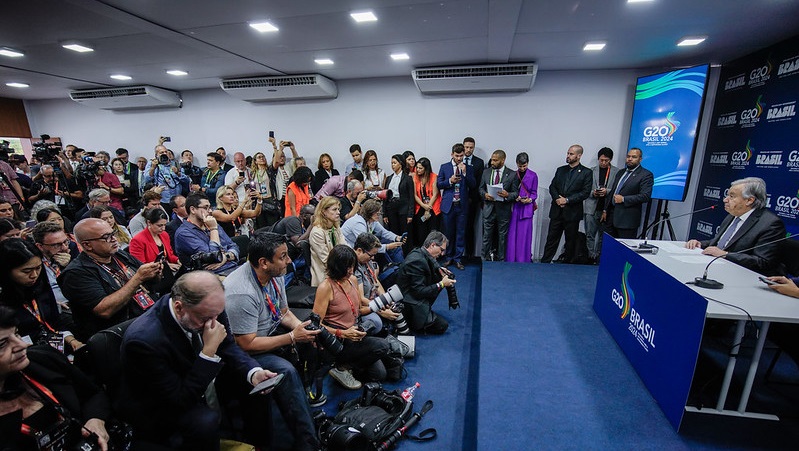This article will be updated throughout the day and an edited version will be sent out each evening as a newsletter – you can sign up here.
G20 finance breakthrough?
As the UN Secretary-General Antonio Guterres touched down in Rio de Janeiro for the G20 leaders meeting last night, his mind was back in Azerbaijan. “I am concerned about the state of the negotiations at COP29 in Baku,” he told a Brazilian press conference.
He’s right to be. Progress on the post-2025 New Collective Quantified Goal (NCQG) for finance has been slow and the ministers arriving today have a lot of work to do.
But a Reuters report boosted hopes for a breakthrough, saying that negotiators of the G20 communique “agreed to a text mentioning developing nations’ voluntary contributions to climate finance, stopping short of calling them obligations, according to two diplomats”.
If that’s agreed by world leaders in Brazil, climate ministers in Baku won’t go against it. That could unlock bigger numbers for the NCQG, as developed countries say this expanding of the contributor base is a condition of them raising their climate finance promise above $100 billion.
We’ll learn more at a public plenary meeting happening on Monday for all negotiators and at a press conference by Azerbaijan’s presidency.
But Baku talks stall on fossil fuel transition
Late on Saturday, when many COP29 delegates were letting their hair down after a long week, negotiators rowed openly over whether discussions on emissions-cutting should continue into the next week or be postponed.
A coalition of developed countries, small islands, the least developed countries and some Latin American nations support using a channel of the talks called the Mitigation Work Programme to take forward last year’s global commitment to transition away from fossil fuels.
They had pushed to set up an emissions-cutting “ facilitation process and platform” and “urge” governments to do things like stop building new coal-fired power plants and phase out (not just, as previously agreed, phase down) coal.
They wanted to set numerical targets for reducing methane emissions, curbing deforestation, increasing energy storage and improving grids to enable the roll-out of renewable energy.
But, speaking in Saturday night’s plenary, Saudi Arabia said this was an attempt at “eroding the flexibility developing countries depend on” and that there should be no new targets or goals.
Bolivia, speaking on behalf of the LMDC group which includes China, also rejected “targets and outlandish proposals”. Iran and India supported this, with India saying that the talks’ conclusions were supposed to be “non prescriptive”. The African group also rejected “attempts to impose new requirements”.
With governments divided over the very purpose of the talks, co-chairs suggested on Saturday not continuing them into the second week and delaying them for six months until the mid-year climate talks in the German city of Bonn – scrapping all the work done in week one. Sources in the room told Climate Home that Saudi Arabia raised this option.
Then, on Monday, COP29 President Mukhtar Babayev said he would make efforts to avoid this happening, adding “COP29 cannot be silent on mitigation” and that he would “address the matter in every direction” available.
At Monday’s plenary, several countries expressed disappointment with the state of the mitigation talks but rejected postponing them to next year, many of them saying this would be a priority.
Australia, on behalf of the Umbrella Group of developed countries, said “some parties consistently blocked” progress and welcomed the presidency’s efforts to keep the talks going. The EU also said this would be a priority.
The AOSIS group of small islands said they would not leave Baku without “a strong mitigation outcome”. “The fact that those discussions are stalled is extremely concerning for our group,” the negotiator from Samoa told the COP plenary.
Switzerland also noted that decisions made in Baku on mitigation will serve to inform the next round of nationally determined contributions (NDCs), which is due next year. “It’s not acceptable that in the very body meant to reduce emissions we do not have a clear message going forward,” the Swiss negotiator said.
The COP president said his team will run consultations with countries, which will be facilitated by Norway and South Africa and will conclude by Wednesday. He also ruled out the possibility of a cover text, which is a high-profile general statement signed off by all governments but not linked to any particular strand of the negotiations.
Andreas Sieber, associate director of policy and campaigns at 350.org, said Saudi Arabia wants to be as “unconstructive as they can be when it comes to fossil fuels” and is “happy to be destructive”. He added that civil society “disagrees” with this because there is a need to talk about implementing last year’s decisions on energy transition as well as finance for that implementation.
